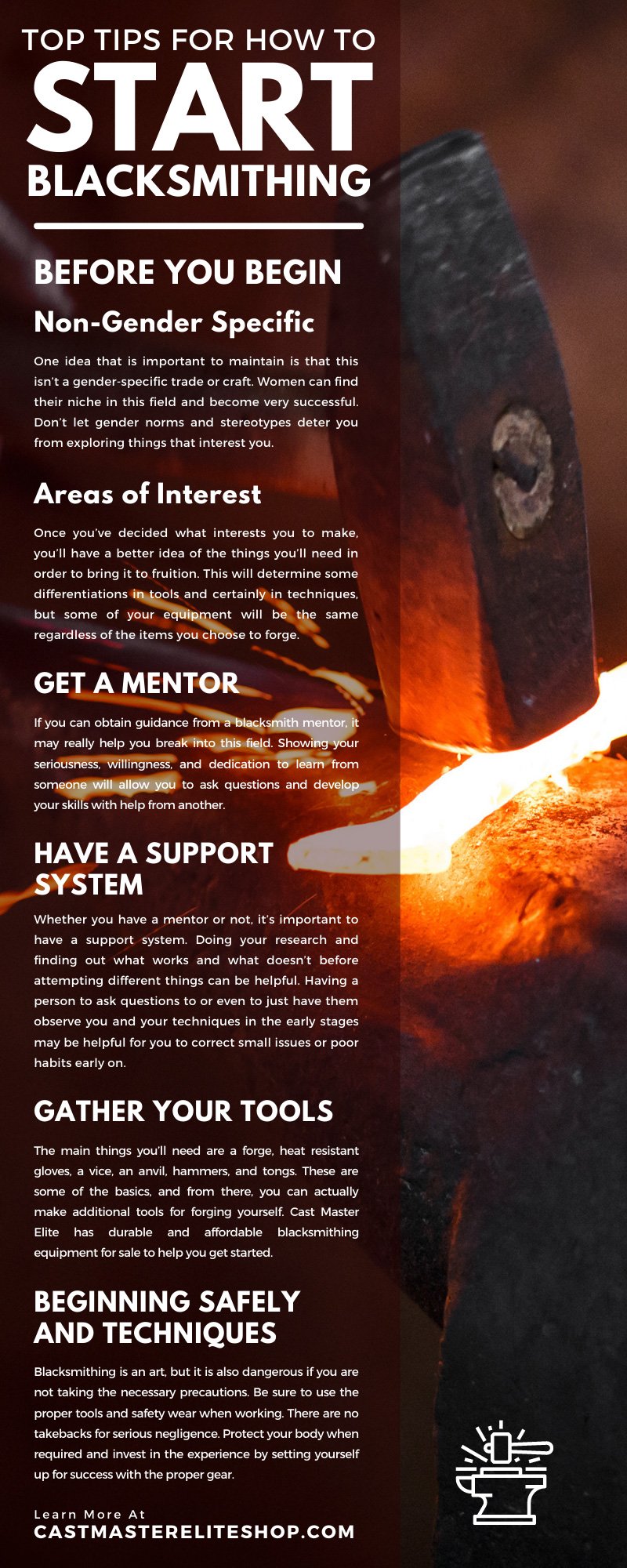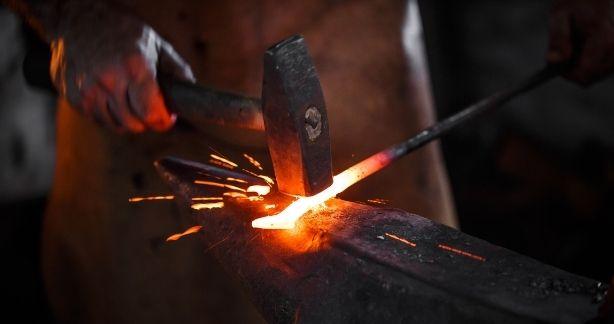As a society in midst of a pandemic, we have more time than usual alone and at home. Many people have used this time to start small businesses, open pages on ecommerce websites designed to sell handmade items, or simply found new ways to expand on previously learned skills. Metalwork has become increasingly popular and apparent as highlighted on some binge-worthy television shows on different streaming platforms, amongst other outlets. So, for a modern-day forger, here are some top tips for how to start blacksmithing.
BEFORE YOU BEGIN
As you prepare for your journey into the world of blacksmithing, there is much to consider. You will want to be sure to cover your bases before beginning to get a better idea of your areas of focus and what you hope to achieve through this trade. Establishing your purpose, even if it changes over time, will help keep you stay grounded and intentional as you learn.
NON-GENDER SPECIFIC
There are many ways you can go when it comes to areas of focus in blacksmithing. One idea that is important to maintain is that this isn’t a gender-specific trade or craft. Though blacksmithing in the past has been geared toward men, that can be said for many things. Women can find their niche in this field and become very successful. Don’t let gender norms and stereotypes deter you from exploring things that interest you.
WHAT YOU CAN FORGE
There is a multitude of items that can be forged by a blacksmith, but larger items such as gates, rails, furniture, or light fixtures may be what you’re looking to make. Other people who focus on art may enjoy creating sculptures, jewelry, or religious items. For the metalworker who sets out to forge practical items, you may find that making tools, cooking utensils, or weapons intrigues you.
AREAS OF INTEREST
Once you’ve decided what interests you to make, you’ll have a better idea of the things you’ll need in order to bring it to fruition. This will determine some differentiations in tools and certainly in techniques, but some of your equipment will be the same regardless of the items you choose to forge. Knowing where your interests lie will help you better prepare to get started.
JOIN A COMMUNITY
In starting new things, you may find it extremely beneficial to seek out likeminded people with similar fascinations. Joining a blacksmith community can be done in many ways. There are certainly online groups through various social media platforms, but there are other ways to connect that may really help you as you begin.
TAKE A CLASS
Enrolling in a class for beginning blacksmiths can do many things for you. First, you’ll have an instructor who can familiarize you with the necessary equipment and basic techniques, as well as acquaint you with important terminology. This will also allow you to get a feel for blacksmithing in general and allow you to find what about it appeals to you. Finally, if you can show that you’re serious about learning, asking intentional questions, and paying attention, your instructor is more likely to find you worthy of spending time answering any additional questions. He or she may also be able to link you with a mentor, sensing your dedication to building your metalwork skills and network.
GET A MENTOR
If you can obtain guidance from a blacksmith mentor, it may really help you break into this field. Showing your seriousness, willingness, and dedication to learn from someone will allow you to ask questions and develop your skills with help from another. At first, being a mentee may mean that you get to observe, but you can make yourself useful even if you’re simply sweeping up, and you stay out of the way when necessary. Paying your dues and sticking it out will let a mentor know that teaching you what they know is not a waste of time or energy, but an opportunity.
HAVE A SUPPORT SYSTEM
Whether you have a mentor or not, it’s important to have a support system. Doing your research and finding out what works and what doesn’t before attempting different things can be helpful. Having a person to ask questions to or even to just have them observe you and your techniques in the early stages may be helpful for you to correct small issues or poor habits early on.
GATHER YOUR TOOLS
To get started, a blacksmith will need to acquire several tools. The main things you’ll need are a forge, heat resistant gloves, a vice, an anvil, hammers, and tongs. These are some of the basics, and from there, you can actually make additional tools for forging yourself. Cast Master Elite has durable and affordable blacksmithing equipment for sale to help you get started.
BEGINNING SAFELY AND TECHNIQUES
It’s important that when you start, you are using reliable equipment. Blacksmithing is an art, but it is also dangerous if you are not taking the necessary precautions. Be sure to use the proper tools and safety wear when working. There are no takebacks for serious negligence. Protect your body when required and invest in the experience by setting yourself up for success with the proper gear. In the beginning, even simple mistakes offer opportunities for education and developing your knowledge. Celebrate them as much as you would success.
PROS OF A PROPANE FORGE
Here are a few advantages to opting to use a propane forge rather than coal or charcoal:
- It’s portable, which is great if you are working with a mentor as well as independently.
- It’s cleaner, and it is very important to keep your workspace as clean as possible.
- It can get hotter than coal or charcoal.
- Small forges need a single propane torch for metalwork, however, sometimes two burners are needed depending on the forge work being done.
WORKING WITH THE PROPANE FORGE
These are gas forges and their primary source of fuel is propane. Following basic rules and taking the proper precautionary measures makes this easy to work with and excellent for use with beginner blacksmiths. Here are some essential tips to consider as you begin your work:
- You are lighting a forge, not a stove. The flame is hot and widespread, and you should ideally light a piece of paper or kindling and place it in the pit near the exhaust. Putting your face down by it is not a good idea. From there, you may increase the gas output slowly to light the flame.
- Use your tongs. You don’t want your hands getting too close to the heated metal. Long-handled tongs keep your body parts away from the fire and hot items.
- A heat shield may benefit you, especially if you operate outdoors. Wind could disturb the flame, causing damage to things nearby. A heatshield is a metal cover that keeps the surroundings of the forge protected.
- Proper ventilation is important because the burning propane produces both carbon dioxide and carbon monoxide.
- Check for gas leaks regularly by using soapy water to detect holes, never a matchstick.
There is much to consider as you explore the world of metalwork. Pay attention to details, as it will keep your work pristine and ensure safety. Follow these top tips for how to start blacksmithing and obtain the proper equipment so that you feel secure as you begin. Always ask questions to fellow blacksmiths when unsure, and good luck on your new venture!







